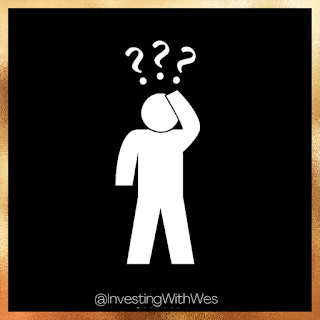Guest Article: Why Are Humans Terrible Investors?
This fantastic article you're about to read is written by Wes Chambers, the investor behind @InvestingWithWes on Instagram.
The title of this article might make some of you pause and wonder why an investing blog would post an article about terrible human investors. But do yourself the favor and read on because you'll find some real important knowledge-nuggets and what to do, to not be a terrible, human investor but instead how you can stay rational when the masses aren't and the herd mentality has taken over.
Why Are Humans Terrible Investors?
By Wes Chambers
In this post, I am going to break down three reasons why humans are terrible at investing. When it comes to investing humans are wired in a way where long-term thinking is very difficult and us being emotional can be our worst enemy. In the stock market, you need certain attributes like patience, the ability to think independently, the ability to learn from your mistakes, and be also unemotional.
Herd Mentality.
In the famous words of Seth Klarman, the herd is always wrong in the long run. In investing herd mentality leads to permanent capital loss.
There are many examples of herd mentality in action whether that is during the late '60s of the “Nifty Fifty”-era when investors flocked to invest in the fastest-growing companies in America such as Walmart, IBM, Polaroid, etc and if you bought the Nifty Fifty stocks during this frenzy and held them for 5 years you lost all your money.
Another example is the “Dot Com”-era where the herd got excited about innovation in the name of the internet. Nobody can argue that the internet did change the world, but the crowd extrapolated that grain of truth and again if you followed the herd into this frenzy, you lost all your money. Falling into the herd mentality is a natural human instinct where if we see a fellow human being doing something that we think might be rewarding we follow them because it is better to cozy up with the herd and be wrong with the herd than stand-alone and look stupid for a while. Standing alone and looking stupid is very contrarian and not many can do this.
Fight Or Flight
This is a passage from the book Dhandho Investor by Mohnish Pabrai: "Our brain have undergone millions of years of evolution, yet they are poorly evolved to deal with the vagaries of the stock market. When the lion roars, our brains tell us to start running. We don't process; we just run. When stock prices drop dramatically, the fear that sets in is similar to hearing the lion roar. Our first instinct is to sell the turkey, purge the memory of ever having owned it, and run away. This is one of the primary reasons why most investors do worse than the stock market indexes.
They are enthusiastic about buying stocks that have been rising, and they are keen to sell positions that have undergone large drops. To counterbalance our messed-up brains, we have to put rational Chakravyuh traversal rules in place to promote rational behaviour."
Chakravyuh traversal rule is when you buy a stock it cannot be sold at a loss within two to three years of buying it. Value Investing legends Guy Spier and Mohnish Pabrai follow this.
Poor learners
History doesn't repeat itself, but it does rhyme. Technology has improved significantly where we can search for anything on the internet with a click of a button but when it comes to the stock market, we seem to keep making the same mistakes as the people in the past despite having so much more information at our disposal than ever before. Humans haven't learned from the Nifty Fifty era or the Dot Com bubble where we allow valuation to get out of control. One way we can change this is to keep learning and writing down our mistakes. If we write down the mistakes that we make, we are more likely not to make the same mistakes again
The Mindset of a Value Investor
How to Prepare for A Bear Market





Comments
Post a Comment